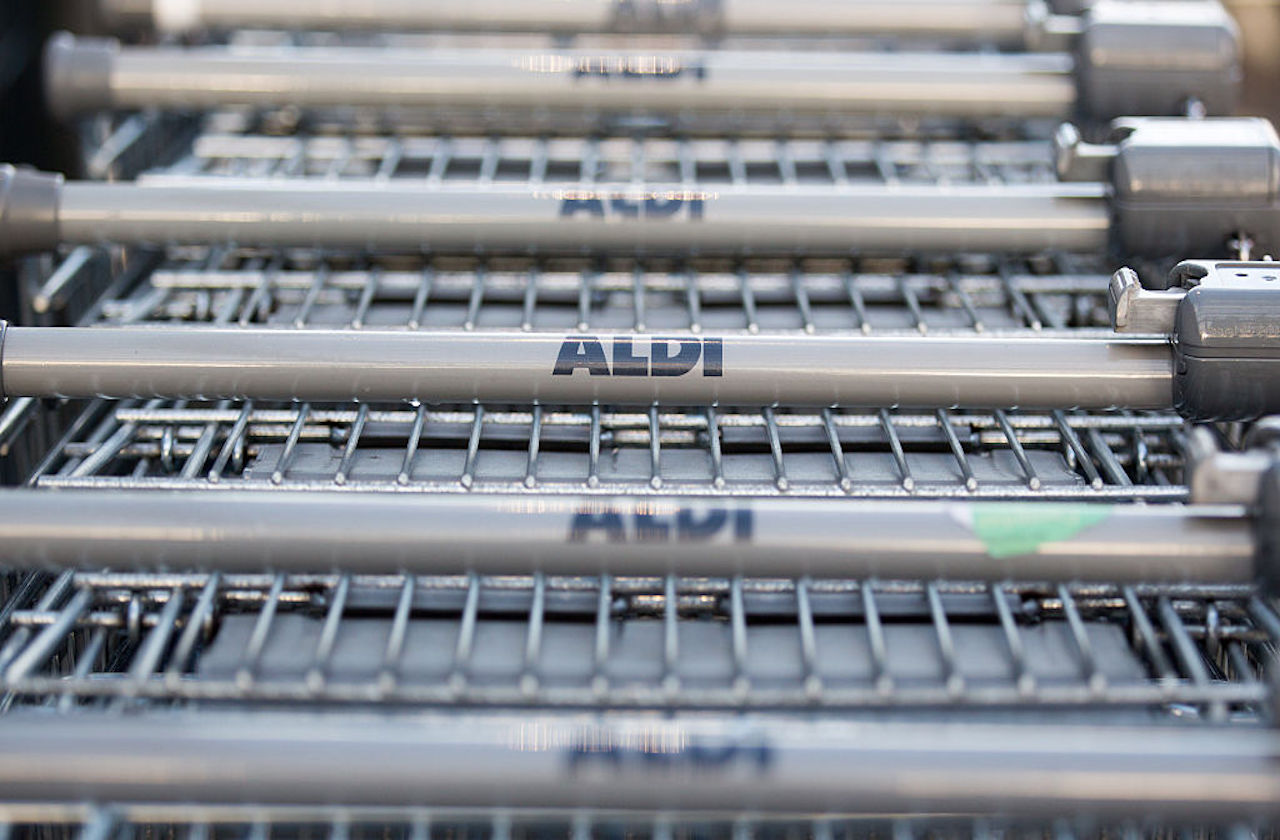3 Grocery Stocks Under Threat from Aldi
The German supermarket's plan to open more U.S. stores is unwelcome news to investors in rival chains.


Profit and prosper with the best of Kiplinger's advice on investing, taxes, retirement, personal finance and much more. Delivered daily. Enter your email in the box and click Sign Me Up.
You are now subscribed
Your newsletter sign-up was successful
Want to add more newsletters?

Delivered daily
Kiplinger Today
Profit and prosper with the best of Kiplinger's advice on investing, taxes, retirement, personal finance and much more delivered daily. Smart money moves start here.

Sent five days a week
Kiplinger A Step Ahead
Get practical help to make better financial decisions in your everyday life, from spending to savings on top deals.

Delivered daily
Kiplinger Closing Bell
Get today's biggest financial and investing headlines delivered to your inbox every day the U.S. stock market is open.

Sent twice a week
Kiplinger Adviser Intel
Financial pros across the country share best practices and fresh tactics to preserve and grow your wealth.

Delivered weekly
Kiplinger Tax Tips
Trim your federal and state tax bills with practical tax-planning and tax-cutting strategies.

Sent twice a week
Kiplinger Retirement Tips
Your twice-a-week guide to planning and enjoying a financially secure and richly rewarding retirement

Sent bimonthly.
Kiplinger Adviser Angle
Insights for advisers, wealth managers and other financial professionals.

Sent twice a week
Kiplinger Investing Weekly
Your twice-a-week roundup of promising stocks, funds, companies and industries you should consider, ones you should avoid, and why.

Sent weekly for six weeks
Kiplinger Invest for Retirement
Your step-by-step six-part series on how to invest for retirement, from devising a successful strategy to exactly which investments to choose.
Aldi's intention to launch almost a thousand new U.S. stores is good news for consumers, but it's just the latest round of bad news for investors in the supermarket sector.
In yet another challenge to entrenched grocery companies, Germany's Aldi announced that it will spend another $3.4 billion to open new stores. The company intends to have 2,500 U.S. locations by 2022, up from 1,600 today. Aldi, which sells mostly private-label brands at deep discounts, had already committed $1.6 billion to remodel 1,300 stores.
Making matters worse, another German discount grocer is entering the U.S. market. Lidl is opening its first U.S. stores on June 15 and plans to price products up to 50% lower than the competition.
From just $107.88 $24.99 for Kiplinger Personal Finance
Become a smarter, better informed investor. Subscribe from just $107.88 $24.99, plus get up to 4 Special Issues

Sign up for Kiplinger’s Free Newsletters
Profit and prosper with the best of expert advice on investing, taxes, retirement, personal finance and more - straight to your e-mail.
Profit and prosper with the best of expert advice - straight to your e-mail.
Grocery costs are falling as supermarkets fight a price war to attract and retain penny-pinching customers. The annual change in prices for food at home declined in 2016, something that hasn't happened in 49 years, according to the Department of Agriculture.
Against that backdrop, Aldi's moves only make life harder for much of the competition. "The increasing presence of discount grocers like Aldi, and soon Lidl, in the U.S. adds further pressure on Walmart and other grocery retailers to maintain price competitiveness," say analysts at Stifel. Why is this bad for business? Because lower prices mean companies have to make do with thinner profit margins.
The bottom line is that the Aldi and Lidl onslaught threatens chains across the spectrum, from the biggest national names to smaller regional players. Here’s a look at three supermarket stocks that could use a break from Aldi.
Walmart Stores
Walmart Stores (symbol: WMT), for example, derives more than half of its revenue from groceries, which is why it has redoubled it efforts to offer everyday low prices. The strategy has been working so far, but it comes with costs, Stifel notes. The focus on everyday low prices has increased traffic and sales, analysts says, and yet it has also put pressure on the retailer's profitability. The increased competition from Aldi in the bricks-and-mortar world comes just as Walmart is making large investments in e-commerce to beat back the threat from Amazon.com (AMZN).
Shares in Walmart's have gained a respectable 15% over the past 52 weeks. (All returns are as of June 14.) The benchmark Standard & Poor's 500-stock index is up 17% over the same span. It would be easier for the stock to catch up if Walmart didn't have more Aldi's gunning for its market share.
Kroger
Walmart may be the world's largest retailer, but Kroger (KR) is the nation's largest supermarket operator. That leaves it widely exposed in the ongoing price war. Analysts at UBS say Kroger continues to deal with persistent food-price deflation and intensifying competition. Indeed, the chain might have to make an acquisition now that market-share gains have petered out amid intense competition and the limits of lower prices, Credit Suisse analysts write. They note that Whole Foods (WFM) would make an attractive target. Kroger acquired the more upscale Harris Teeter supermarket chain in 2014 for $2.5 billion.
Whatever Kroger chooses to do, it should probably do it pretty soon. The company's stock has lost 13% over the past year.
SuperValu
SuperValu (SVU) really finds itself in a pinch, as its Shop N’ Save and Cub Foods nameplates get squeezed from Kroger and Walmart on one side and by Aldi on the other. When SuperValu suffered an unexpected loss for its fiscal third quarter ended December 3, the chief operating officer said at the time that at least two-thirds of its stores have "an unprecedented amount of new competition." Note well that Aldi has been expanding in SuperValu's home turf in the Midwest. Results in the more recent fiscal fourth-quarter report were better than analysts expected, but the retail side of the business still saw flagging sales and declining profits. That's partly why earlier this year we said SuperValu is a stock investors should avoid.
Shares in SuperValu are down 11% over the past 52 weeks and have fared even worse as a longer term holding. The stock has lost 48% in the last three years.
Profit and prosper with the best of Kiplinger's advice on investing, taxes, retirement, personal finance and much more. Delivered daily. Enter your email in the box and click Sign Me Up.

Dan Burrows is Kiplinger's senior investing writer, having joined the publication full time in 2016.
A long-time financial journalist, Dan is a veteran of MarketWatch, CBS MoneyWatch, SmartMoney, InvestorPlace, DailyFinance and other tier 1 national publications. He has written for The Wall Street Journal, Bloomberg and Consumer Reports and his stories have appeared in the New York Daily News, the San Jose Mercury News and Investor's Business Daily, among many other outlets. As a senior writer at AOL's DailyFinance, Dan reported market news from the floor of the New York Stock Exchange.
Once upon a time – before his days as a financial reporter and assistant financial editor at legendary fashion trade paper Women's Wear Daily – Dan worked for Spy magazine, scribbled away at Time Inc. and contributed to Maxim magazine back when lad mags were a thing. He's also written for Esquire magazine's Dubious Achievements Awards.
In his current role at Kiplinger, Dan writes about markets and macroeconomics.
Dan holds a bachelor's degree from Oberlin College and a master's degree from Columbia University.
Disclosure: Dan does not trade individual stocks or securities. He is eternally long the U.S equity market, primarily through tax-advantaged accounts.
-
 Dow Adds 1,206 Points to Top 50,000: Stock Market Today
Dow Adds 1,206 Points to Top 50,000: Stock Market TodayThe S&P 500 and Nasdaq also had strong finishes to a volatile week, with beaten-down tech stocks outperforming.
-
 Ask the Tax Editor: Federal Income Tax Deductions
Ask the Tax Editor: Federal Income Tax DeductionsAsk the Editor In this week's Ask the Editor Q&A, Joy Taylor answers questions on federal income tax deductions
-
 States With No-Fault Car Insurance Laws (and How No-Fault Car Insurance Works)
States With No-Fault Car Insurance Laws (and How No-Fault Car Insurance Works)A breakdown of the confusing rules around no-fault car insurance in every state where it exists.
-
 If You'd Put $1,000 Into AMD Stock 20 Years Ago, Here's What You'd Have Today
If You'd Put $1,000 Into AMD Stock 20 Years Ago, Here's What You'd Have TodayAdvanced Micro Devices stock is soaring thanks to AI, but as a buy-and-hold bet, it's been a market laggard.
-
 If You'd Put $1,000 Into UPS Stock 20 Years Ago, Here's What You'd Have Today
If You'd Put $1,000 Into UPS Stock 20 Years Ago, Here's What You'd Have TodayUnited Parcel Service stock has been a massive long-term laggard.
-
 If You'd Put $1,000 Into Lowe's Stock 20 Years Ago, Here's What You'd Have Today
If You'd Put $1,000 Into Lowe's Stock 20 Years Ago, Here's What You'd Have TodayLowe's stock has delivered disappointing returns recently, but it's been a great holding for truly patient investors.
-
 If You'd Put $1,000 Into 3M Stock 20 Years Ago, Here's What You'd Have Today
If You'd Put $1,000 Into 3M Stock 20 Years Ago, Here's What You'd Have TodayMMM stock has been a pit of despair for truly long-term shareholders.
-
 AI Stocks Lead Nasdaq's 398-Point Nosedive: Stock Market Today
AI Stocks Lead Nasdaq's 398-Point Nosedive: Stock Market TodayThe major stock market indexes do not yet reflect the bullish tendencies of sector rotation and broadening participation.
-
 If You'd Put $1,000 Into Coca-Cola Stock 20 Years Ago, Here's What You'd Have Today
If You'd Put $1,000 Into Coca-Cola Stock 20 Years Ago, Here's What You'd Have TodayEven with its reliable dividend growth and generous stock buybacks, Coca-Cola has underperformed the broad market in the long term.
-
 If You Put $1,000 into Qualcomm Stock 20 Years Ago, Here's What You Would Have Today
If You Put $1,000 into Qualcomm Stock 20 Years Ago, Here's What You Would Have TodayQualcomm stock has been a big disappointment for truly long-term investors.
-
 Nasdaq Rises 2.7% as Musk Tweets TSLA Higher: Stock Market Today
Nasdaq Rises 2.7% as Musk Tweets TSLA Higher: Stock Market TodayMarkets follow through on Friday's reversal rally with even bigger moves on Monday.